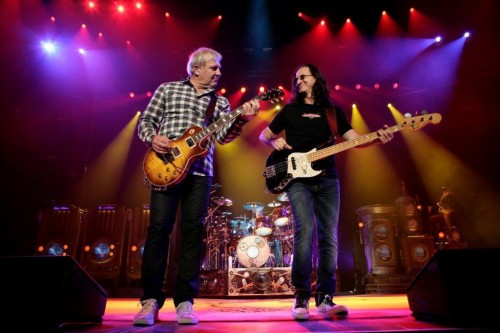My Back Pages is a series that explores our relationships with the music we grew up with. Canadian hard rock trio Rush is the subject of the first installment.
We have friends that we talk to all the time. Some we speak to every day. Then there are folks that we don’t communicate with so much anymore. There are no hard feelings, but it’s just the way things worked out. Wives, husbands, babies, jobs, moving across country. Life happens. But when you do reconnect with them, you pick up right where you left off, and it’s a pretty rewarding feeling. You’re immediately transported back to a more innocent time. College. High school. Driving around in your first car. Hanging out in the woods with friends and beers you “borrowed” from a friend’s dad.
That’s how it is with me and Rush.
I don’t listen to Rush all the time. There are some Rush albums I might never listen to again. But when I do throw on a Rush CD or turn up at one of their concerts, I am taken to another place. I’m bouncing a tennis ball off the back of our house, and “Subdivisions” is blasting from the neighbor’s garage radio tuned to Rock 107. Or in my room listening to a “Moving Pictures” cassette loaned to me by my friend Vito. Or angry because after I’ve borrowed a tape from another friend, Chris, my mother thinks her son is dabbling in devil worship thanks to a song called “Temples of Syrinx.”
For a while, there were really only two people in the world that impressed me: Yankees first baseman Don Mattingly and Rush drummer Neil Peart. I’d watch Neil’s solo on the “A Show Of Hands” VHS tape over and over, tapping along on pillows or a black, rubber practice pad. Later I’d graduate to my own drum set, purchased with money I earned as the scorekeeper and manager of our freshman basketball team. With headphones plugged into boombox, I’d slave over every last note of, say, “Red Barchetta,” taking each fill or cymbal crash more seriously than any homework I might have had that night.
I’m sure there are reasons I was drawn to the music of Rush. It’s energetic. It’s kind of weird. Much of it is complex. Countless aspiring musicians are attracted to Rush. Whether you play drums, bass or guitar, you’re going to become a better player by listening to this band, even if it turns out that you can’t even play half of the licks accurately.
Then there’s the lyrics, another reason I held Neil in such high esteem. Not only was this guy the best drummer I’ve ever heard, he also wrote all of the band’s lyrics. And this wasn’t “I wanna rock and roll all night and party ev-er-y day” stuff. No. Nicknamed The Professor, Neil would quote Shakespeare or Alfred Lord Tennyson in his lyrics. He’d write songs about censorship, religion and the development of the atomic bomb for Christ’s sake.
Looking back now, as an older, cynical adult, the whole thing was a bit pretentious. A guy playing a set of drums so large that its pieces surrounded him, writing rock songs that could pass for freshman English comp assignments. Maybe rock should be visceral; three chords and four beats per measure. But when you’re young and idealistic – and maybe a little bit of an outsider – there’s nothing better than this shit.
There’s an earnestness in Rush’s music and lyrics that I still find admirable. It’s about not accepting the status quo and not being afraid to be seen as uncool. Recognition and mainstream acceptance was never the band’s primary goal, but the past few years – with the band’s profile surging thanks to the documentary film “Before The Lighted Stage” and the recent announcement that Rush has finally been inducted into the Rock and Roll Hall of Fame – have shown that persistence is often rewarded.
If that sounds cheesy or overly utopian, so be it. That’s the point: listening to certain music connects us to our more innocent past, when anything could happen.
In May, I’ll be meeting some friends in Hershey, Pa., for my seventh Rush show. The band will play songs from the 1970s, ’80s, ’90s and beyond. And with each Alex Lifeson guitar solo, Neil Peart drum fill or Geddy Lee bass run, I’ll be whisked back to my youth, when the new Rush album or magazine cover was all that mattered.
When the show is over, it will be back to the real world for everyone filing out of the arena. Back to being fathers, employees, bosses, lawyers, janitors or teachers. We might not give our old friend Rush a passing thought for another week, a month or even a year.
But for us, knowing that a Rush tune is just a stereo button or mouse click away is the next best thing to a time machine.




Leave a Reply